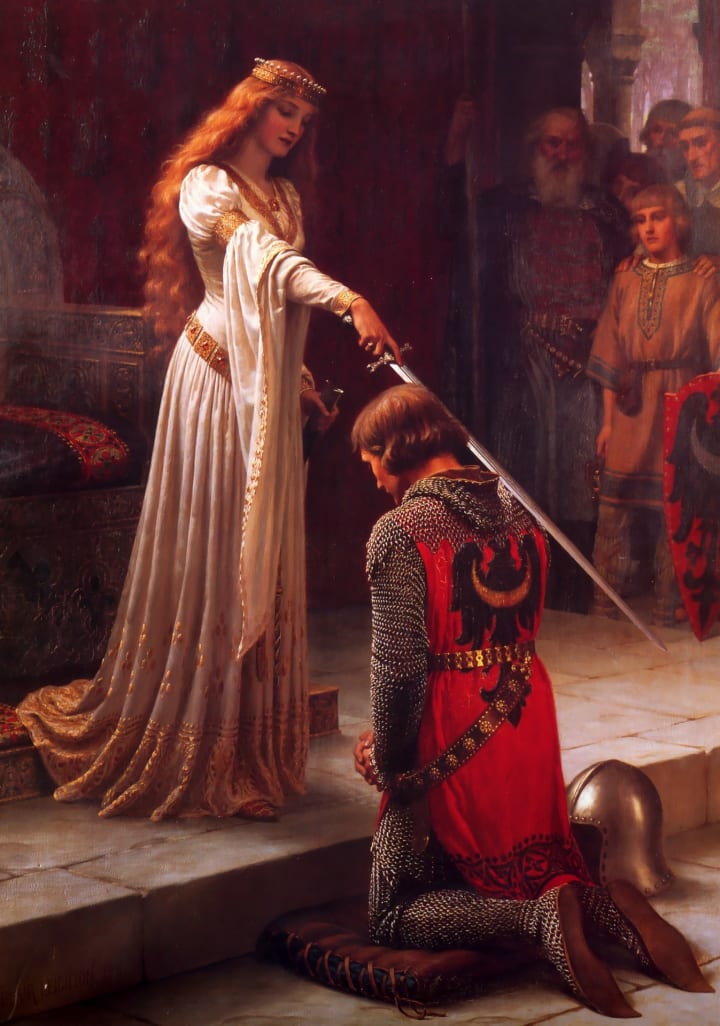5 Tips For Playing Better Bards
A Pathfinder RPG Guide

Bards. They're performers and spies, battle drummers, healers, storytellers, and commanders. The class's powers are so varied and flexible that bards are one of the most fluid base classes. Whether a party is delving into a dungeon that's been sealed for a thousand years, hunting assassins in the king's court, or on the front lines of a major war, you should always bring a bard with you.
If you're having trouble stepping out of the stereotypical bard box, though, don't worry. This guide will give you a short list of questions you should ask about your bard that can help shape them into a concept that is anything but expected. In fact, for a little extra fun, don't let anyone other than the DM see your character sheet, and see how long it takes the rest of the table to figure out what your character class is based on the way you act.
As a final note, this guide is designed primarily for the Pathfinder roleplaying game, but similar systems may find these suggestions applicable. Also, if you like this guide, I've covered the other core classes as well! Go check them out at the 5 Tips Master List on my gaming blog Improved Initiative. And if you'd like to see more content just like this, then take a look at my full Vocal archive, as well!
Tip #1: What Does Your Performance Look Like?

Some bards bring their own pyrotechnics.
A large part of a bard's abilities are based off their ability to perform. With that said, though, you have a lot of options beyond your usual song and dance.
An example mentioned above is a battle drummer. Drums were used to communicate on the battlefield, along with flags, allowing large troop movements to be coordinated without the delay of sending runners. A bard who comes from a military background, whether they were part of an organized army or a rag-tag group of raiders, might know the rhythms to heat his allies' blood to boiling, giving them courage in the fight. Alternatively, a bard might have been a commander, or a drill sergeant in charge of bellowing orders and bolstering morale. A high skill rank in Oratory, combined with an equally high rating in Intimidate, might represent a captain who was more frightening than any enemy his troops might face, and who goaded them on through terrified adrenaline. You might even find The Chaplain preaching fiery sermons, healing the wounded and slinging steel, even though it's arcane power rather than divine will that flows through him.
Of course, there is something to be said for more traditional sorts of bards as well. A rousing song might allow allies to better coordinate, fighting to the rhythm of the bard's beat. A simple tune plucked on a mandolin could relax the trapsmith, allowing him to make better progress on the job than if he was working in silence. A dancer's fluid grace might spin out, infecting her allies, drawing them along in the wake of the magic.
The way you perform is central to who a bard is. So ask yourself what their performance looks like when you're spending rounds to bolster your team.
Tip #2: Who Taught Your Bard Their Skills?
Bards cast spells spontaneously, and their magic develops without either the study and careful planning of wizards, or the prayers of clerics. Cousins to sorcerers, bards will their magic into being.
With all that said, it's a good idea to ask who, if anyone, helped your bard put an edge on the talent they were born with. Or how your bard acquired their power, if it was through something that happened after they were born (such as making a deal with a potent entity, like The Fossegrim Bard).
For example, did your bard attend a university where more experienced magic users could help them find a way to get a grip on their talents? Was your bard apprenticed to someone who worked with them, finding the right performances, the right forms, and the proper exercises to help them make their talents shine? Or are they self-taught, working out the specifics in jerks and starts until they understood their own talent, and how to make it manifest? Was the Song passed onto them by another who had grown too old to sing anymore? Did they cut themselves on an enchanted guitar string, and let the rhythm into their blood?
All of these are options, but it's important to ask how your bard became a bard. How young did they start, and who, if anyone, helped them grow into what they are now?
Tip #3: What Is Your Profession?

Like all great minstrels, a knight first, and a singer second.
As gamers, we tend to fall into the trap of referring to our characters by their classes. What we forget when we do this is that a class is just a meta-concept; a name for a certain package of abilities. No one goes around calling themselves a fighter, for instance. No more than you show up to a job and say you deserve the gig because you're a barbarian, or a rogue. The problem is that some classes do, in fact, have the names of professions in the world. A wizard is a wizard, no matter how you slice it. Bards tend to occupy that middle zone; that could be the profession they claim, or it could just be a lazy use of class as a placeholder.
So ask yourself how the character will respond to the question, "So, what do you do?"
Are you a singer? A poet? Do you play drums in a band? Are you a storyteller, or an actor? Or, if you've gone in a different direction, are you an explorer? Perhaps a chronicler of great deeds, or a student of history? Are you a professor? A crier, reading out the latest proclamations in a voice that cannot be ignored? Are you a dirge singer for the mercenary company known as the Harbingers of Sorrow? Do you sail beneath the black flag of the Sea Vultures? Do you ride with the highwaymen who've pledged loyalty to the Dreadskull?
Nowhere is it written that you have to be a traveling musician. You can be, but there are all sorts of other uses you can bend your talents toward.
If some of those above choices appealed to you, though, then you might want to check out the mercenary companies, bandit gangs, and pirate crews in:
- 100 Fantasy Bands: If you're a traditional performer, this supplement has an entire list of folks you may have played with, met on the road, or even battled on stage.
- 100 Random Mercenary Companies: Mercenary companies are always in need of those who can lead and direct soldiers in the field. So if you learned the art of steel and strategy alongside song and spell, this might be the place for you.
- 100 Random Bandits to Meet: Whether you've been a bandit yourself, or you simply know the crowd from your time entertaining in the right taverns, there's dozens of hard cases between these pages that you may have worked alongside not all that long ago. And for sea reavers, especially those who beat the drum for the oars, 100 Pirates to Encounter may be what you need instead!
Tip #4: Do You Travel?

It would be nice, but really, this place won't catalog itself!
One of the biggest tropes that affects this class is an age-old explanation for bardic knowledge. Bards, as we all know, can make untrained knowledge checks with a bonus equal to half their class level. Why can they do this? Well, the assumption is because bards travel around and spend time in all sorts of places. From taverns and gambling halls, to palaces and courts, bards hear things. So they know a bit of everything.
So you need to ask two questions here. Do you travel? And if you do, why do you travel?
For example, if you're a talented enough performer, why can't you make a living in a city? Bars, night spots, street corners, and parties all need entertainers. Libraries need keepers, colleges need teachers, and armies need recruiters. There are all kinds of jobs you could do without ever having to leave the city limits.
Alternatively, you could be a traveling bard. Perhaps you're part of the circus, or you play summer festivals, if you're a traditional sort of bard. If you're not a traditionalist then you might be a sailor, a traveling merchant (like some of the folks found in 100 Merchants to Encounter), an announcer for tournaments and games, or even a professional athlete who boosts his team to victory. Whatever your job is, you need to stay on the move to do it.
Both situations are totally viable, but you should figure out which one really applies to your character.
The next question you need to ask is, "Why am I on this adventure?"
A bard, just like anyone else, has a job. They have commitments, ties, goals, and needs. So ask yourself why your bard took up this particular call. Especially if it requires them to travel (if they don't), or to stop traveling (if they do).
The reason can be as simple or complicated as you want. Maybe the librarian wants to get out into the field to experience ancient ruins first-hand. Perhaps your commander ordered you to go with a team to see what is happening out in the hinterlands, and to report back on what you find. You might be a detective whose pursuit of a criminal has snowballed into something bigger, or maybe your friend is going treasure hunting and you want to watch their back. And if there's actually treasure at the end of that road, hey, bonus!
Tip #5: How Do You Practice?

Don't mind me, just tuning up!
Not everyone reads the Core Rulebook cover to cover, and they can easily miss the text on page 220 which states both bards and sorcerers need to focus for about 15 minutes after 8 hours of rest in order to cast their spells for the day. Bards, however, must expressly perform in some way to warm up their magic.
So what do you do to warm up for the day?
This could be as small, personal, or intricate, as you need want it to be, as a player. Does your bard make some mint julip tea and go through their full range to wake up their voice? Do they check their instrument and play a song or two, adjusting as necessary? Do they stretch and go through a dance routine, or work on their comedic timing for those wicked barbs they plan to use later in the day? Additionally, does your bard do it by themselves, or do they include other people in their warm-up as the straight man, a dance partner, etc. to make sure you're in top performing shape?
This routine can grow and change as your bard develops in power, as well. Perhaps they always start the day with the basics, trying to stay humble, but perhaps by the time they reach mid-levels they have a full Disney princess style start to their day, with songbirds and forest creatures lending their harmony, compelled by the awakening magic of their music. It's entirely up to you!
About the Creator
Neal Litherland
Neal Litherland is an author, freelance blogger, and RPG designer. A regular on the Chicago convention circuit, he works in a variety of genres.
Blog: Improved Initiative and The Literary Mercenary






Comments
There are no comments for this story
Be the first to respond and start the conversation.